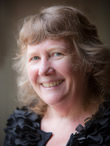Institute Director
 |
| Photo by John Kish IV |
Hilde Binford received her Ph.D. in musicology from Stanford University. Her undergraduate degree was in history, focusing on the Reformation period, and her doctoral dissertation was on medieval music. She has taught courses in Baroque music at Stanford University and Georgetown University, and she currently teaches music history at Moravian College. Since joining the Moravian College faculty, she has coordinated the biennial Moravian Music Conference and directed five NEH Institutes on J. S. Bach. Her recent publications focus on 18th century religious music, particularly the music of the Anabaptists and Pietists.
Curriculum Consultant
 Louise Forsyth, Master Teacher, served as head of the History Department at Poly Prep Country Day School. She has taught high school for twenty years after having taught at community colleges for seven years. She has an M.A. in European history and completed the coursework towards the doctorate. She teaches Advanced Placement European history, Advanced Placement World history, psychology, economics, and comparative religion. She has participated in numerous NEH institutes and seminars, in two Fulbright- Hays programs, and in a Goethe Institute trip to Germany for teachers.
Louise Forsyth, Master Teacher, served as head of the History Department at Poly Prep Country Day School. She has taught high school for twenty years after having taught at community colleges for seven years. She has an M.A. in European history and completed the coursework towards the doctorate. She teaches Advanced Placement European history, Advanced Placement World history, psychology, economics, and comparative religion. She has participated in numerous NEH institutes and seminars, in two Fulbright- Hays programs, and in a Goethe Institute trip to Germany for teachers.
Institute Faculty
Craig Atwood is an Associate Professor of Moravian Theology and Ministry at the Moravian Seminary. He is recognized as a specialist on the Reformation, having authored two books and over fifty academic articles, chapters in books, and book reviews on the topic.
Greg Funfgeld is now in his 32nd season as artistic director and conductor of The Bach Choir of Bethlehem, which was founded in 1898. Mr. Funfgeld is the architect and director of the Choir’s outstanding educational outreach programs, including Bach to School.
Larry Lipkis is the Bertha-Mae Starner '27 and Jay F. Starner Professor of Music and Composer in Residence at Moravian College. He directs the early music activities at the College, which include the Collegium Musicum and the Mostly Monteverdi Ensemble, and also teaches composition and music theory. Dr. Lipkis is also a member of the Baltimore Consort, an acclaimed early-music ensemble specializing in popular music of the Renaissance and Baroque eras. Its program "Bach and His Lutheran Predecessors" was performed at the 97th Bethlehem Bach Festival in 2004. Dr. Lipkis also has taught an adult education class called "J.S. Bach: His Life, His Works, His Faith" at Moravian Theological Seminary and First Presbyterian Church of Bethlehem and presented a lecture on Bach's St. John Passion at the Philadelphia Bach Festival. In 1998, he teamed with Loretta O'Sullivan, principal cello of the Bach Festival Orchestra, for a pre-concert lecture before a performance by Yo-Yo Ma of Bach's six suites for unaccompanied cello.
Renée Anne Louprette is University Organist and Coordinator of the Organ Department at Mason Gross School of the Arts, Rutgers University, and a former member of the organ faculty at the Manhattan School of Music, The Hartt School of the University of Hartford, and Montclair State University. She has served as organist and associate director of several major liturgical music programs in New York City, including the Church of St. Ignatius Loyola, Trinity Wall Street, and All Souls Unitarian Church. She is a candidate for the Master of Music degree in conducting at Bard College Conservatory.
Ms. Louprette has concertized throughout Europe, North America, and Australia and has performed with the Mostly Mozart Festival Orchestra, Orchestre National de Toulouse, Queensland Symphony Orchestra, Los Angeles Dance Project, American Symphony Orchestra, Clarion Music Society, The Dessoff Choirs, and Piffaro. She holds degrees from the Centre d’Études Supérieures de Musique et de Danse de Toulouse, France, the Conservatoire National de Région de Toulouse, and the Hartt School of the University of Hartford, where she earned a Bachelor of Music degree summa cum laude in piano performance. She has been a featured recitalist at national and regional conventions of the American Guild of Organists and is in frequent demand as a master class teacher.
Michael Marissen holds a B.A. from Calvin College and Ph. D. from Brandeis University. He joined the Swarthmore College music faculty in 1989 and since then has also been a visiting professor at Princeton University and the Oberlin College Conservatory of Music. He has published many articles on J.S. Bach’s instrumental and vocal music and is the author of The Social and Religious Designs of J.S. Bach’s Brandenburg Concertos (Princeton) and Lutheranism, anti-Judaism, and Bach’s St. John Passion (Oxford); editor of Creative Responses to Bach from Mozart to Hindemith (Nebraska); and co-author of An Introduction to Bach Studies (Oxford) with Daniel R. Malamed. His most recent book is Bach and God.
Markus Rathey studied musicology, Protestant theology, and German philology in Germany, and currently teaches at Yale University. His research interests are J. S. Bach and the relationship among music, religion, and politics during the Enlightenment.
George Stauffer is currently serving as the Dean of the Mason Gross School of the Arts and Professor of Music History at Rutgers University. He received his B.A. from Dartmouth College, his M.A. from Bryn Mawr College, and his M. Ph. and Ph.D. in musicology from Columbia University. He has written seven books on J. S. Bach and the music of the Baroque, including Bach: the Mass in B Minor (1997). His latest work is Why Bach Matters, forthcoming by Yale University Press.
Peter Wollny studied musicology, art history, and German literature at Cologne University before pursuing his doctoral studies at Harvard University. He received his Ph.D. there in 1993 with a doctoral thesis on the works of Wilhelm Friedemann Bach. Since 1993 he has been employed at the Bach-Archiv Leipzig, and as of 2015, he is the Director. Wollny also works for the Neue Bach-Ausgabe, for which he has edited several volumes; he is one of three General Editors of Carl Philipp Emanuel Bach: The Complete Works, sole editor of the works of Wilhelm Friedemann Bach, editor of the Bach-Jahrbuch and the Jahrbuch Mitteldeutsche Barockmusik. He has published numerous articles on the music of the seventeenth and eighteenth centuries and is currently working on a study on seventeenth-century sacred music in Protestant Germany. Wollny teaches regularly at the universities of Leipzig, Dresden and Weimar.
Any views, findings, conclusions, or recommendations expressed on this website do not necessarily represent those of the National Endowment for the Humanities.